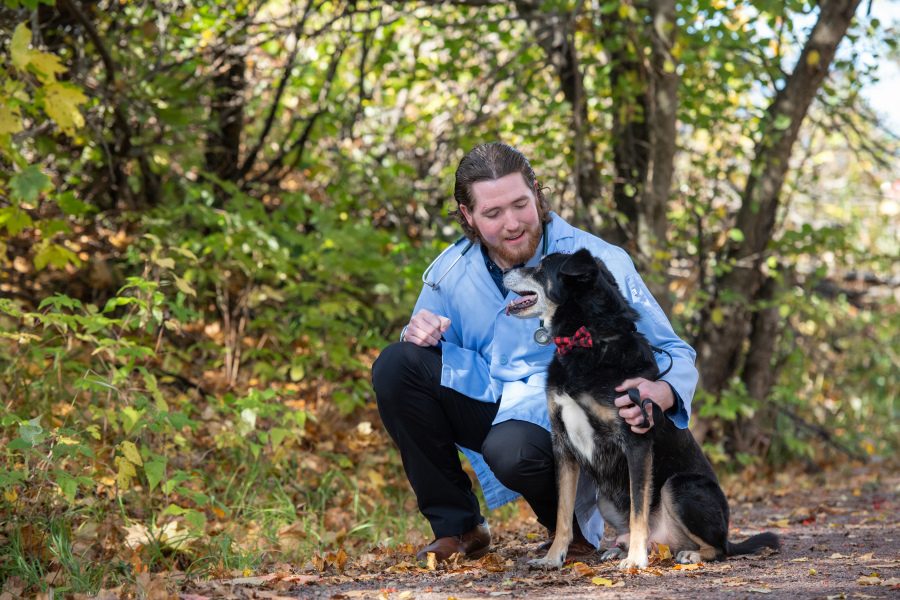AVC faculty member receives funding for ‘spectrum of care’ course for students

Veterinarian Michelle Evason will never forget her first emergency shift just four weeks after she graduated from veterinary college. On a hot July night almost 20 years ago, a young boy, accompanied by his mother, brought in his cat. The animal was very sick—it was ice cold to the touch, barely able to lift its head, and lethargic.
Evason knew what the problem was—a blocked urinary tract—and how to treat it. But in the end, the family could not afford to pay for the procedure that could have saved the cat they clearly loved. The only other option was humane euthanasia.
“They started to cry, and I left the exam room and started to cry also. I had been trained to know what to do to help the cat, but they couldn’t afford it…and I felt like all of my education was for nothing, since I couldn’t help him or his loving family. Feeling as devastated as the little boy and mom, I did everything I could to provide him with a peaceful, pain-free, and dignified death through humane euthanasia. The next day, a homemade card arrived for me from the cat’s family, thanking me for my kindness and care. I felt like a failure.”
Evason promised herself that if she was ever in a position to teach veterinary students, she would do her best to help them learn the skills they would need to avoid feeling like she did on that night—and on subsequent occasions.
Now an associate professor of small animal internal medicine at UPEI’s Atlantic Veterinary College, Evason is able to fulfil that vow, thanks to a $50,000 grant from the US-based Stanton Foundation’s canine care course development program. This is the first time that the Foundation has given a grant in Canada under its canine health and welfare portfolio.
With the funding, Evason is developing a new third-year elective course that will teach veterinary students to identify and define “spectrum of care” and give them the tools they need to address the issue. The course will be the first of its kind to be taught at a veterinary college in Canada.
“Spectrum of care” is defined as the availability and accessibility of veterinary medical care regardless of the socio-economic status of the pet owner, said Evason. It is well recognized that increasing veterinary costs in the United States and Canada have contributed to a reduction in pet visits to veterinary clinics with a subsequent impact on animal health and welfare. The current approach to veterinary care and training has established a culture and methodology in which there is a perception that “gold standard” care is the only means to deliver quality medicine, but an increasing proportion of pet owners cannot afford the associated costs.
Evason hears every day from fellow veterinarians that their client cannot afford the options that she has been trained to teach are the “gold standard” for the pet, she said. She works with them to come up with options that the client might be able to afford and discuss what outcome—be it quality of life, or pain-free or pain-reduced time—they want to achieve for the pet and owner.
Evason said there is an immediate need to ensure that veterinarians, especially new graduates, are prepared to assess, deliver, and communicate treatment plans to clients that include veterinary medicine along the spectrum of care—from quality lower cost options to “gold standard” medicine. This course is designed to address that need and provide veterinary students with a toolkit to deliver spectrum of care to pets on day one post-graduation.
The course will be offered in the winter 2020 semester, said Evason. Using the knowledge and skills they have gained in their veterinary education, third-year students will learn to develop diagnostic and treatment options that span the full spectrum of care for common clinical conditions, determine the likelihood of success of the options, and design communication plans to help clients make informed and shared decisions. Local veterinarians in private practice will be involved in teaching and evaluating the course, sharing their experiences and mentoring the students.
“I’m so grateful to the Stanton Foundation for believing that this effort is worthwhile and funding our grant proposal,” she said.
“The Stanton Foundation is very pleased to be supporting the development of courses which will train students to provide veterinary care to pets of clients from across a broad socioeconomic continuum while continuing to operate sustainable practices,” said Steve Kidder, spokesperson for the Foundation. “Frank Stanton cared deeply that quality veterinary care be widely available to pet owners of modest means and recognized that training students to provide services along the spectrum of care was the best way to achieve that goal.”
-30-
About the Stanton Foundation
The Stanton Foundation, created by Dr. Frank Stanton (1908–2006), supports areas where he was unable to complete his charitable intentions during his lifetime. One of Dr. Stanton’s great interests was canine health and welfare. The Foundation’s support in this area includes research and traditional grant programs to promote the welfare of dogs and strengthen the human-dog bond. To learn more about the Stanton Foundation and its interests, visit http://thestantonfoundation.org/
About the Atlantic Veterinary College
The Atlantic Veterinary College at the University of Prince Edward Island is committed to improving the health and welfare of animals and humans through excellence in education, research, and professional service to Atlantic Canadian provinces, Canada, and the world. One of five veterinary colleges in Canada, AVC is fully accredited by the American and Canadian Veterinary Medical Associations and is recognized by the Royal College of Veterinary Surgeons, United Kingdom.